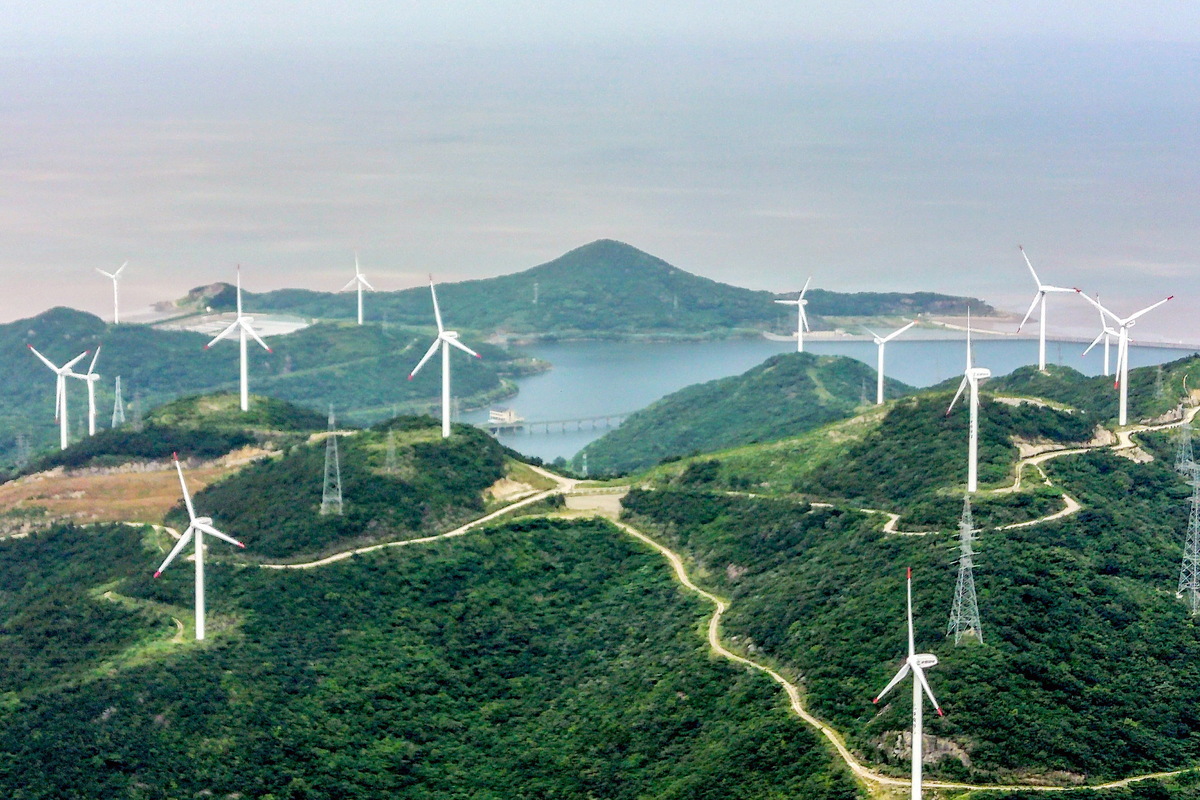China matching green words with eco deeds


Experts say nation honors commitments, willing to 'walk the walk' in climate fight
China has matched its climate change mitigation commitments with a detailed road map and slew of concrete actions, and the nation has risen to the challenge of transitioning to green energy, officials and experts have said.
They commented in response to criticism from some Western nations as the 26th United Nations Climate Change Conference of the Parties, or COP26, in Glasgow, Scotland drew to a close on Friday.
In his written statement to the COP26, President Xi Jinping reiterated the need to focus on concrete actions in response to the climate crisis, saying that China will foster a green, low-carbon, and circular economic system at a faster pace, press ahead with industrial structure adjustment, and rein in the irrational growth of energy-intensive and high-emissions projects.
"Visions will come true only when we act on them," he said. "We will speed up the transition to green and low-carbon energy, vigorously develop renewable energy, and plan and build large wind and photovoltaic power stations."
Analysts said the scale and depth of China's climate actions are unprecedented, even as the world's second-largest economy and largest developing country is faced with an equally urgent task to keep up economic growth and raise people's living standards.
"In a sense, China is still in its early youth in terms of economic growth. But the nation has already taken up the responsibility of a grown-up in its climate actions," said Zhang Yuquan, an associate professor at the China-UK Low-Carbon College at Shanghai Jiaotong University.
"The nation has risen up to the arduous challenges by rolling out a portfolio of policy measures, and involving both the public sector and the market to join the actions. China now has a clear pathway to a decarbonized future."
In the follow-up to his announcement last year that China will peak carbon emission before 2030 and attain carbon neutrality before 2060, Xi presided over several key meetings to lay out a policy framework for the climate response actions.
A meeting of the Central Committee for Financial and Economic Affairs, chaired by Xi in March, mapped out a host of measures to help the nation to honor its climate commitments.
A master working guideline was unveiled last month, aiming to elevate energy efficiency to an advanced international level, and lift non-fossil energy consumption to more than 80 percent of the whole by 2060.
The State Council, China's Cabinet, published a concrete action plan last month for peaking carbon emission before 2030, which includes specific targets for different sectors as the nation forges ahead to phase out coal consumption and increase renewable energy.
Together, the policy documents would form a 1+N policy system that would provide a road map the country needs to follow, including tasks for key sectors.
Xie Zhenhua, China's special climate envoy, said at a media briefing on the sidelines of COP26 that distant targets and slogans are far from enough, and clear road maps coupled with transformation in the economy and society, as well as innovation and cooperation, can truly solve the problems.
"China is not only talking the talk, but also walking the walk. We have not only set the targets, but also determined the corresponding policy measures, actions and investments," he said. "We have timetables and road maps. We honor every commitment we have made, and that can truly speak volumes for the level of actions."
State Councilor and Foreign Minister Wang Yi also underscored China's concrete actions in its climate fight, saying that China is not only a serious-minded and responsible participant in the process of tackling climate change, but also, more importantly, a doer that keeps feet on the ground.
In addition to policy initiatives already rolled out to support the climate actions, the nation is vigorously developing renewable energy, with 15 of the world's top 20 photovoltaic companies and all of the top five being Chinese, he told Spain's Foreign Minister Jose Manuel Albares Bueno in a meeting via video link last week.
He added that seven of the world's top 10 wind power companies are Chinese, and the nation has phased out 120 million kilowatts of installed coal-fired power generation capacity during the past decade, more than the United Kingdom's existing total installed capacity.
China has topped the global new-energy vehicle market since 2015, and the nation's forest coverage rose sharply, from a mere 8.6 percent in 1949 to 23.04 percent by the end of 2020, according to official statistics.
Wang stressed that going green will not happen overnight but should be planned scientifically and pursued in an orderly and progressive fashion.
The nation's challenges in transitioning to green energy were highlighted in a wide-ranging power shortage in September and last month, which even resulted in outages in residential communities and hospitals in parts of Northeast China.
He Yun, an associate professor at Hunan University, who has closely followed the climate crisis, said China has pledged to achieve carbon neutrality only 30 years after its carbon emissions peak — a much shorter span than the European Union, United States, and Japan.
"This would call for the world's fastest-growing economy to cut its economy from fossil fuels, and accelerate its clean-energy investments at a pace few had dared believe was possible," she said.
Other analysts said China's climate ambitions were fully demonstrated in its 14th Five-Year Plan (2021-25), which stipulated that the nation must cut energy consumption per unit of GDP by 13.5 percent, and carbon dioxide emissions per unit of GDP by 18 percent, in the next five years.
"Six of the eight binding targets in the 14th Five-Year Plan are related to the environment. That shows a strong emphasis from the central government on the climate targets. It will also give people confidence in China's all-out efforts over reaching these goals," said Dimitri De Boer, chief representative for China of environmental law organization ClientEarth, and team leader of the EU-China Environment Project.
De Boer noted that China's economy has had a strong reliance on carbon-intensive sectors, and the nation's economy is now faced with downside pressure, which has brought about greater challenges to carbon reduction efforts.
"Despite the challenges, the nation has brought the approvals of programs with high energy consumption and high emissions under effective policy control, and the overall carbon emission appear to be reaching a plateau," he said.
He added that China's "1+N" climate action plan has set a strong, overarching policy framework for the peaking, and subsequent constant reductions, of carbon emissions, and the nation must prioritize efforts to bring all key stakeholders, including local governments, businesses, and the public, on board going forward.
"There is a need for greater public awareness of the climate crisis, so that the whole society can take part in the transformation," he said.
- Xi's remarks chart course for Asia-Pacific region to defeat pandemic, restore economic growth: Chinese FM
- COP26 negotiators rush to get deal
- UK says hopes to close COP26 climate summit Saturday
- Bank of China marks listing of green bonds at London Stock Exchange
- China's goodwill in climate cooperation: China Daily editorial
- Top court urges stricter regulation of minors' online behavior
- Ministry issues new work injury insurance guide
- New guidelines safeguard seniors' prepaid care fees
- Changzhou trials upgraded 'cloud bus' system for rural mobility
- Black-necked cranes return to Guizhou's Caohai reserve for winter
- Top political advisor calls for sound formulation of 2026 consultation plan





































